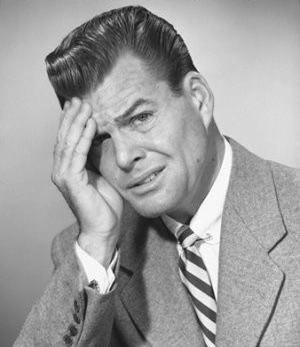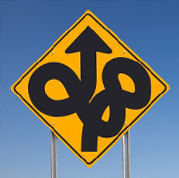 Cavs Archive
Cavs Archive  Conflicted
Conflicted
 Don’t get me wrong. I love it as much as the next guy when the Cavaliers win. But when they lose nowadays (and that’s quite often), my heart doesn’t fall out of my chest as it did in the bygone days of Mark Price and Brad Daugherty and that guy from Akron St.V-St.M. All those regular-season games back then really meant something: momentum and playoff seeding.
Don’t get me wrong. I love it as much as the next guy when the Cavaliers win. But when they lose nowadays (and that’s quite often), my heart doesn’t fall out of my chest as it did in the bygone days of Mark Price and Brad Daugherty and that guy from Akron St.V-St.M. All those regular-season games back then really meant something: momentum and playoff seeding.
My expectations for the current Cavs are extremely low, but I want them to perform well...sort of. They seem like nice guys. Most games, they play their hearts out. They are even more entertaining to watch than their record might indicate. Hell, Andy Varejao is worth the price of admission all by his ownself. If they win, that means they're making progress; but if they lose, they're on their way to more ping-pong balls in the spring draft.
That said, the team's future is still hazy, maybe even cloudy. Just two of their current players might be starters on a playoff-caliber team. You know their names: Irving and Varejao. From his point-guard position, Kyrie has the basketball smarts and athletic ability to take over a ball game. And as for Andy? I’ve never, ever seen a player bring as much energy to a game as he does. He is easily the second-most watchable Cav in the past 20 years. (Aside: If Andy doesn’t make the all-star team this year, there is something very, very wrong with the NBA.)
But the rest of the team is very suspect. As a matter of fact, as things stand today, it would appear that beyond Kyrie and Andy, there aren’t many other serviceable parts.
General manager Chris Grant has drafted fourth in the first round the past two years and has received, at best, a couple of guys who might make decent second-stringers on a playoff-caliber team. This is not all his fault, because the college players available in those two drafts have, by and large, not possessed the cumulative talent level of previous drafts. No Tim Duncans or Dwight Howards or Derrick Roses.
So after choosing Irving #1 in 2011, Grant was content to draft two extremely athletic players—neither of whom have been especially impressive yet.
I love Tristan Thompson, 2011’s #4, who we’ve watched for about 100 games now. He gives some great interviews during the Cavs’ telecasts. But he reminds me of a big kangaroo. He can get from one end of the court to the other in the blink of an eye. He can jump out of the building. He’s got a big derrière. But he’s got little offense beyond the occasional dunk, and his defense is sometimes suspect. Like your average everyday kangaroo, he simply has no inkling of how to play the game, and he really hasn't shown much improvement since his debut last fall.
On the other hand, Dion Waiters, 2012’s #4, shows some promise. His three-point shooting has been a surprise. On occasion, he can get to the hole. His defense isn’t all that terrible. But—and it’s a big but—he is, like Irving, a point guard. Anybody tells you otherwise, he’s hallucinating. If and when the Cavs become contenders, they will probably possess a true two-guard who will relegate Waiters to the role of Kyrie’s back-up.
 Holes to Fill
Holes to Fill
Despite playing some decent teams (Miami and Memphis) down to the wire earlier this week, the Cavs obviously have many holes to fill, as was evident in the loss to Phoenix, never mind that it was their fourth game in five nights. Actually, with the exception of Irving, they are not really any closer to being a bona fide contender than they were two years ago. And that’s bad news for fans of Varejao, because his value to the team at this juncture is probably as trade bait. By the time the Irving-led Cavaliers are ready to turn the corner, Andy will probably be pretty much over the hill, so it would actually be in the team’s best interest to move him to a current contender and avail themselves of either younger talent or a future high draft choice. Maybe even before the year's out, because his value will never be higher.
The difference between winning and losing in the NBA is the third starter. Teams with two all-star-caliber starters seldom have won championships in recent years; but teams with three all-star-caliber starters often end the season in the championship circle: Wade, Bosh and You-Know-Who; Pierce, Garnett and Allen; Bryant, Gasol and Bynum; Nowitzki, Marion and Terry. As it stands, the Cavs have two of those high-value starters, but one (Andy) is not likely to be around when they eventually, hopefully, contend.
The only way out of this admitted hole—created when a certain superstar jumped ship—is to draft, sign or trade for two all-star players to complement Irving, most likely a true shooting guard and a small forward or a center who can create his own shots. GM Grant will then have to find a couple more contributive bench players to go along with Thompson, Waiters, Tyler Zeller and maybe Alonzo Gee. All of which will take more time: two or three years minimum—and isn't that exactly what we were saying two long years ago?
So that’s why it certainly does a body good to see the Cavs win, but it doesn’t hurt quite so much when they lose. Game to game, there’s simply not that much on the line (a #3 or #4 position in next year’s draft versus maybe a #7 or #8 position). Either way, they have a lot of ground to make up before we can even think “playoffs,” much less “championship.” I know it. You know it. Dan Gilbert knows it. Byron Scott knows it. And, most importantly, Chris Grant knows it...I think.
- NBA Announces 2013-2014 Schedule
- Browns Ink Sharknado
- Sharknado A No-Show For Rookie Camp
- Trent Richardson Out Until Training Camp
- Browns Sign Brandon Jackson
- Carrasco Suspended Eight Games
- Browns Add to Wide Receiver Depth with David Nelson
- Browns Need to Learn from Past Draft Mistakes
- Browns Release Chris Gocong and Usama Young
- Browns Missing on Grimes Disappointing, But Not The End
The TCF Forums
- Official- Browns Coach Search/Rumors
Hikohadon (Tuesday, January 21 2014 1:24 PM) - Movies coming out
rebelwithoutaclue (Tuesday, January 21 2014 12:56 PM) - 2015 Recruiting
jclvd_23 (Tuesday, January 21 2014 12:38 PM) - The 2014 Offseason Thread
Larvell Blanks (Tuesday, January 21 2014 12:25 PM) - Chris Grant's first 3 drafts
Kingpin74 (Tuesday, January 21 2014 10:13 AM) - Mike Brown
YahooFanChicago (Monday, January 20 2014 11:15 PM) - 2014 Hoops Hockey Hijinx
jpd1224 (Monday, January 20 2014 4:44 PM) - 2014 Recruiting
jclvd_23 (Monday, January 20 2014 2:26 PM) - Wish List - #4 Pick
Hikohadon (Monday, January 20 2014 1:26 PM) - #1 overall pick Anthony Bennett
TouchEmAllTime (Sunday, January 19 2014 1:28 PM)



